Hyundai Bayon vs VW Polo – Which model is better for everyday use?
Everyday use, family trips or long-distance drives – here’s where the differences show.
Discover whether Hyundai Bayon or VW Polo fits your lifestyle better.
Costs and Efficiency:
Price and efficiency are key factors when choosing a car – and this is often where the real differences emerge.
VW Polo has a to a small extent advantage in terms of price – it starts at 17000 £, while the Hyundai Bayon costs 20100 £. That’s a price difference of around 3056 £.
Fuel consumption also shows a difference: VW Polo manages with 5.10 L and is therefore slight more efficient than the Hyundai Bayon with 5.40 L. The difference is about 0.30 L per 100 km.
Engine and Performance:
Under the bonnet, it becomes clear which model is tuned for sportiness and which one takes the lead when you hit the accelerator.
When it comes to engine power, the VW Polo has a convincingly edge – offering 207 HP compared to 100 HP. That’s roughly 107 HP more horsepower.
In acceleration from 0 to 100 km/h, the VW Polo is significantly quicker – completing the sprint in 6.50 s, while the Hyundai Bayon takes 11.30 s. That’s about 4.80 s faster.
In terms of top speed, the VW Polo performs noticeable better – reaching 240 km/h, while the Hyundai Bayon tops out at 179 km/h. The difference is around 61 km/h.
There’s also a difference in torque: VW Polo pulls clearly perceptible stronger with 320 Nm compared to 200 Nm. That’s about 120 Nm difference.
Space and Everyday Use:
Cabin size, boot volume and payload all play a role in everyday practicality. Here, comfort and flexibility make the difference.
Both vehicles offer seating for 5 people.
In curb weight, VW Polo is hardly perceptible lighter – 1143 kg compared to 1170 kg. The difference is around 27 kg.
In terms of boot space, the Hyundai Bayon offers a bit more room – 411 L compared to 351 L. That’s a difference of about 60 L.
In maximum load capacity, the Hyundai Bayon performs hardly perceptible better – up to 1205 L, which is about 80 L more than the VW Polo.
When it comes to payload, Hyundai Bayon slight takes the win – 465 kg compared to 457 kg. That’s a difference of about 8 kg.
Who wins the race?
The VW Polo proves to be is largely superior and therefore becomes our DriveDuel Champion!
VW Polo is the better all-rounder in this comparison.
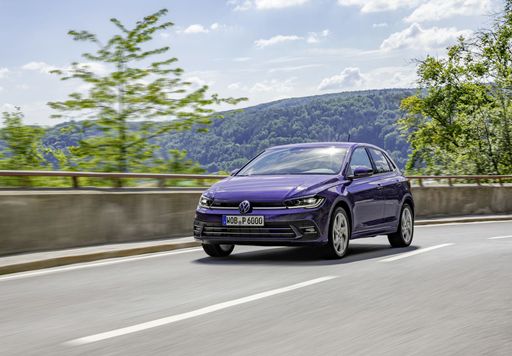 @ Volkswagen AG / VW Media
@ Volkswagen AG / VW Media
VW Polo
Hyundai Bayon
The Hyundai Bayon slips neatly between city runabout and small SUV, offering surprising practicality and a fresh, confident design that stands out in urban traffic. It's an easy buy for shoppers who want smart packaging, tidy handling and a dash of personality without fuss — a sensible little crossover that makes everyday driving a bit more enjoyable.
details @ Hyundai Motor Company
@ Hyundai Motor Company
 @ Hyundai Motor Company
@ Hyundai Motor Company
 @ Hyundai Motor Company
@ Hyundai Motor Company
 @ Hyundai Motor Company
@ Hyundai Motor Company
 @ Hyundai Motor Company
@ Hyundai Motor Company
VW Polo
The Polo is a small car with surprisingly grown-up refinement, delivering comfortable packaging, crisp handling and a build quality that punches above its class. For buyers who want a practical, fuss-free hatch that still feels a little premium, it’s a sensible, slightly cheeky choice you’ll enjoy every day.
details @ Volkswagen AG / VW Media
@ Volkswagen AG / VW Media
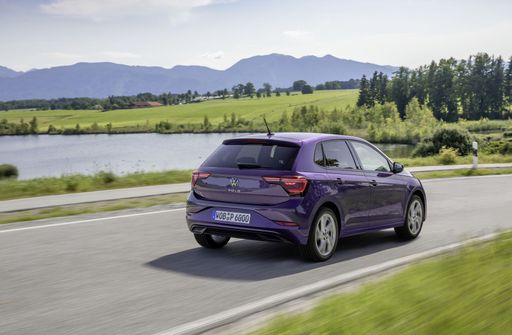 @ Volkswagen AG / VW Media
@ Volkswagen AG / VW Media
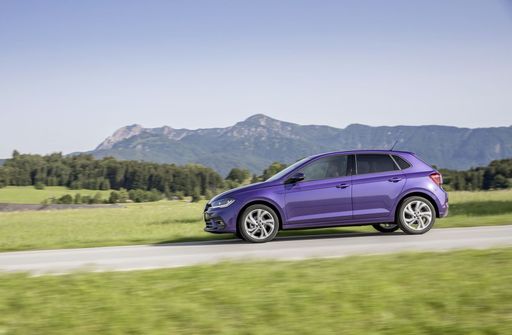 @ Volkswagen AG / VW Media
@ Volkswagen AG / VW Media
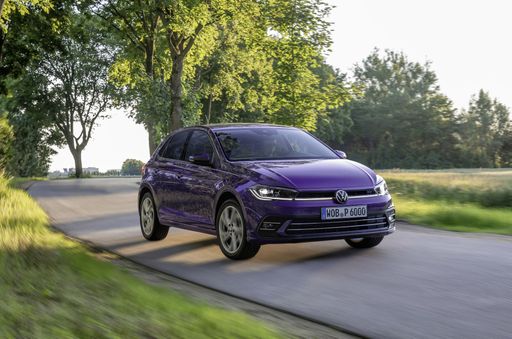 @ Volkswagen AG / VW Media
@ Volkswagen AG / VW Media
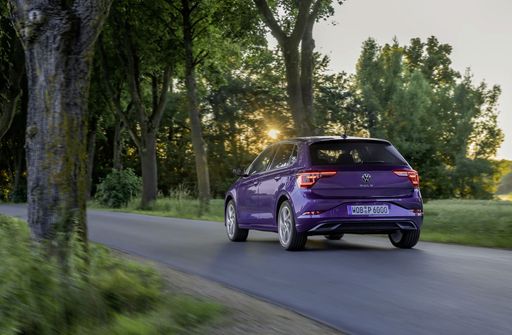 @ Volkswagen AG / VW Media
@ Volkswagen AG / VW Media
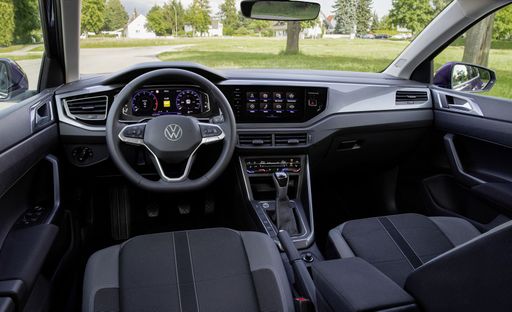 @ Volkswagen AG / VW Media
@ Volkswagen AG / VW Media
 @ Hyundai Motor Company
@ Hyundai Motor Company
|
 @ Volkswagen AG / VW Media
@ Volkswagen AG / VW Media
|
|
|
|
Costs and Consumption |
|
|---|---|
|
Price
20100 - 25800 £
|
Price
17000 - 30400 £
|
|
Consumption L/100km
5.4 - 5.5 L
|
Consumption L/100km
5.1 - 6.5 L
|
|
Consumption kWh/100km
-
|
Consumption kWh/100km
-
|
|
Electric Range
-
|
Electric Range
-
|
|
Battery Capacity
-
|
Battery Capacity
-
|
|
co2
124 g/km
|
co2
116 - 148 g/km
|
|
Fuel tank capacity
40 L
|
Fuel tank capacity
40 L
|
Dimensions and Body |
|
|---|---|
|
Body Type
SUV
|
Body Type
Hatchback
|
|
Seats
5
|
Seats
5
|
|
Doors
5
|
Doors
5
|
|
Curb weight
1170 - 1195 kg
|
Curb weight
1143 - 1378 kg
|
|
Trunk capacity
411 L
|
Trunk capacity
351 L
|
|
Length
4180 mm
|
Length
4074 mm
|
|
Width
1775 mm
|
Width
1751 mm
|
|
Height
1500 mm
|
Height
1431 - 1451 mm
|
|
Max trunk capacity
1205 L
|
Max trunk capacity
1125 L
|
|
Payload
460 - 465 kg
|
Payload
432 - 457 kg
|
Engine and Performance |
|
|---|---|
|
Engine Type
Petrol
|
Engine Type
Petrol
|
|
Transmission
Manuel, Automatic
|
Transmission
Manuel, Automatic
|
|
Transmission Detail
Manual Gearbox, Dual-Clutch Automatic
|
Transmission Detail
Manual Gearbox, Dual-Clutch Automatic
|
|
Drive Type
Front-Wheel Drive
|
Drive Type
Front-Wheel Drive
|
|
Power HP
100 HP
|
Power HP
80 - 207 HP
|
|
Acceleration 0-100km/h
11.3 - 12.4 s
|
Acceleration 0-100km/h
6.5 - 15.6 s
|
|
Max Speed
176 - 179 km/h
|
Max Speed
171 - 240 km/h
|
|
Torque
172 - 200 Nm
|
Torque
93 - 320 Nm
|
|
Number of Cylinders
3
|
Number of Cylinders
3 - 4
|
|
Power kW
74 kW
|
Power kW
59 - 152 kW
|
|
Engine capacity
998 cm3
|
Engine capacity
999 - 1984 cm3
|
General |
|
|---|---|
|
Model Year
2024
|
Model Year
2024 - 2025
|
|
CO2 Efficiency Class
D
|
CO2 Efficiency Class
D, E
|
|
Brand
Hyundai
|
Brand
VW
|
What drivetrain options does the Hyundai Bayon have?
The Hyundai Bayon is available as Front-Wheel Drive.
The prices and data displayed are estimates based on German list prices and may vary by country. This information is not legally binding.
